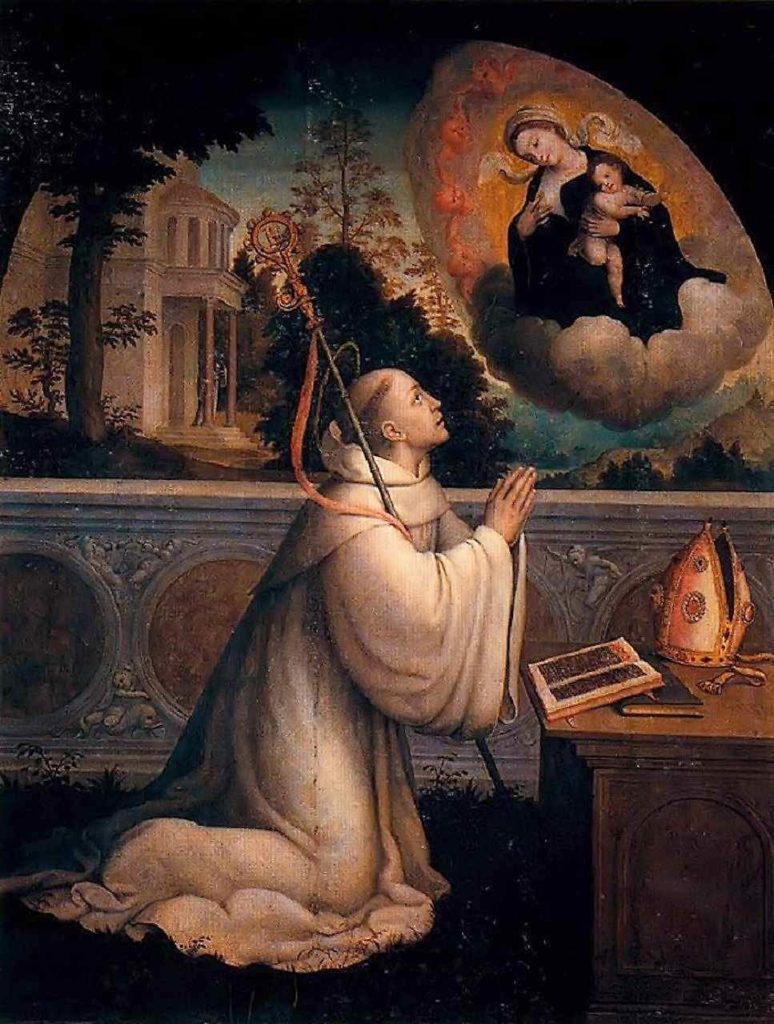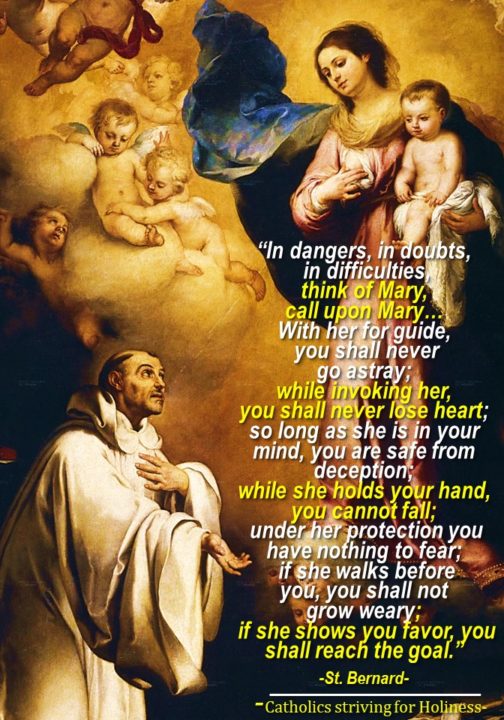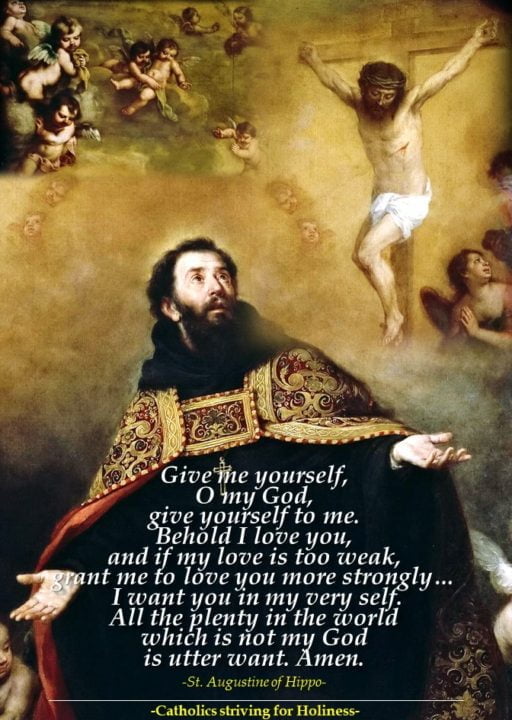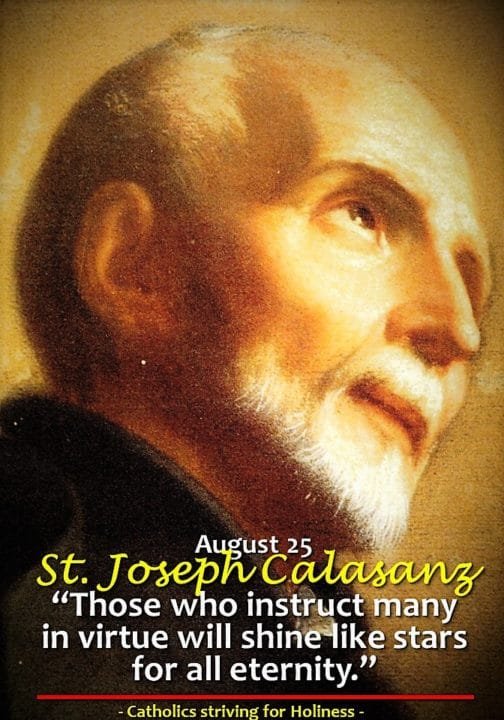POPE BENEDICT XVI ON ST. BERNARD CLAIRVAUX (Aug. 20)

Today, the calendar mentions among the day’s saints Bernard of Clairvaux, a great Doctor of the Church who lived between the eleventh and twelfth centuries (1091-1153). His example and teachings are proving more useful than ever, even in our time. Having withdrawn from the world after a period of intense inner travail, he was elected abbot of the Cistercian Monastery of Clairvaux at age twenty-five, remaining its guide for thirty-eight years until his death. His dedication to silence and contemplation did not prevent him from carrying out intense apostolic activity. He was also exemplary in his commitment to battle against his impetuous temperament, as well as in his humility, by which he recognized his own limitations and shortcomings.
The riches and merits of his theology do not lie in having taken new paths, but rather in being able to propose the truths of the faith in a style so clear and incisive that it fascinated those listening and prepared their souls for recollection and prayer. In every one of his writings, one senses the echo of a rich interior experience, which he succeeded in communicating to others with a surprising capacity for persuasion. For him, love is the greatest strength of the spiritual life. God, who is love, creates man out of love and out of love redeems him. The salvation of all human beings, mortally wounded by original sin and burdened by personal sins, consists in being firmly attached to divine love, which was fully revealed to us in Christ Crucified and Risen.
In his love, God heals our will and our sick understanding, raising them to the highest degree of union with him, that is, to holiness and mystical union. Saint Bernard deals with this, among other things, in his brief but substantial Liber de Diligendo Deo.
There is then another writing of his that I would like to point out, De Consideratione, addressed to Pope Eugene III. Here, in this very personal book, the dominant theme is the importance of inner recollection—and he tells this to the Pope—an essential element of piety.
It is necessary, the Saint observes, to beware of the dangers of excessive activity whatever one’s condition and office, because, as he said to the Pope of that time and to all Popes, to all of us, many occupations frequently lead to “hardness of heart”; “they are none other than suffering of spirit, loss of understanding, dispersion of grace” (II, 3).
This warning applies to every kind of occupation, even those inherent in the government of the Church. In this regard, Bernard addresses provocative words to the Pontiff, a former disciple of his at Clairvaux: “See”, he writes, “where these accursed occupations can lead you, if you continue to lose yourself in them. . . without leaving anything of yourself to yourself” (ibid.).
How useful this appeal to the primacy of prayer and contemplation is also for us! May we too be helped to put this into practice in our lives by Saint Bernard, who knew how to harmonize the monk’s aspiration to the solitude and tranquility of the cloister with the pressing needs of important and complex missions at the service of the Church
Let us entrust this desire, not easy to find, that is, the equilibrium between interiority and necessary work, to the intercession of Our Lady, whom he loved from childhood with such a tender and filial devotion as to deserve the title: “Marian Doctor”.
Let us now invoke her so that she may obtain the gift of true and lasting peace for the whole world. In one of his famous discourses, Saint Bernard compares Mary to the Star that navigators seek so as not to lose their course: “Whoever you are who perceive yourself during this mortal existence to be drifting in treacherous waters at the mercy of the winds and the waves rather than walking on firm ground, turn your eyes not away from the splendor of this guiding star, unless you wish to be submerged by the storm!. . . Look at the star, call upon Mary. . . . With her for a guide, you will never go astray;. . . under her protection, you have nothing to fear; if she walks before you, you will not grow weary; if she shows you favor, you will reach the goal” (Hom. Super Missus Est II, 17).
SOURCE: http://www.vatican.va/content/benedict-xvi/en/angelus/2006/documents/hf_ben-xvi_ang_20060820.html EMPHASIS MINE

Saint Bernard of Clairvaux [is] called “the last of the Fathers” of the Church because once again in the twelfth century he renewed and brought to the fore the important theology of the Fathers. We do not know in any detail about the years of his childhood; however, we know that he was born in 1090 in Fontaines, France, into a large and fairly well-to-do family.
As a very young man he devoted himself to the study of the so-called liberal arts—especially grammar, rhetoric, and dialectics—at the school of the canons of the Church of Saint-Vorles at Châtillon-sur-Seine; and the decision to enter religious life slowly matured within him.
At the age of about twenty, he entered Cîteaux, a new monastic foundation that was more flexible in comparison with the ancient and venerable monasteries of the period while at the same time stricter in the practice of the evangelical counsels. A few years later, in 1115, Bernard was sent by Stephen Harding, the third Abbot of Cîteaux, to found the monastery of Clairvaux. Here the young Abbot—he was only twenty-five years old—was able to define his conception of monastic life and set about putting it into practice.
In looking at the discipline of other monasteries, Bernard firmly recalled the need for a sober and measured life, at table as in clothing and monastic buildings, and recommended the support and care of the poor. In the meantime the community of Clairvaux became ever more numerous, and its foundations multiplied.
In those same years before 1130, Bernard started a prolific correspondence with many people of both important and modest social status. To the many Epistolae of this period must be added numerous Sermones, as well as Sententiae and Tractatus. Bernard’s great friendship with William, Abbot of Saint-Thierry, and with William of Champeaux, among the most important figures of the twelfth century, also dates to this period.
From 1130 on, Bernard began to concern himself with many serious matters of the Holy See and of the Church. For this reason he was obliged to leave his monastery ever more frequently, and he sometimes also traveled outside France. He founded several women’s monasteries and engaged in a lively correspondence with Peter the Venerable, Abbot of Cluny. . . . In his polemical writings he targeted in particular Abelard, a great thinker who had conceived of a new approach to theology, introducing above all the dialectic and philosophical method in the construction of theological thought.
On another front, Bernard combated the heresy of the Cathars, who despised matter and the human body and consequently despised the Creator. On the other hand, he felt it was his duty to defend the Jews and condemned the ever more widespread outbursts of anti-Semitism. With regard to this aspect of his apostolic action, several decades later Rabbi Ephraim of Bonn addressed a vibrant tribute to Bernard. In the same period the holy Abbot wrote his most famous works, such as the celebrated Sermons on the Song of Songs [In Canticum Sermones]. In the last years of his life—he died in 1153—Bernard was obliged to curtail his journeys but did not entirely stop traveling. He made the most of this time to review definitively the whole collection of his Letters, Sermons, and Treatises.
Worthy of mention is a quite unusual book that he completed in this same period, in 1145, when Bernardo Pignatelli, a pupil of his, was elected Pope with the name of Eugene III. On this occasion, Bernard, as his spiritual father, dedicated to his spiritual son the text De Consideratione [Five Books on Consideration] which contains teachings on how to be a good Pope. In this book, which is still appropriate reading for the Popes of all times, Bernard did not only suggest how to be a good Pope, but also expressed a profound vision of the mystery of the Church and of the mystery of Christ which is ultimately resolved in contemplation of the mystery of the Triune God. “The search for this God who is not yet sufficiently sought must be continued,” the holy Abbot wrote, “yet it may be easier to search for him and find him in prayer rather than in discussion. So let us end the book here, but not the search” (XIV, 32: PL 182, 808) and journey on toward God.
I would now like to reflect on only two of the main aspects of Bernard’s rich doctrine: they concern Jesus Christ and Mary Most Holy, his Mother. His concern for the Christian’s intimate and vital participation in God’s love in Jesus Christ brings no new guidelines to the scientific status of theology. However, in a more decisive manner than ever, the Abbot of Clairvaux embodies the theologian, the contemplative, and the mystic. Jesus alone—Bernard insists in the face of the complex dialectical reasoning of his time—Jesus alone is “honey in the mouth, song to the ear, jubilation in the heart (mel in ore, in aure melos, in corde iubilum)”. The title Doctor Mellifluus, attributed to Bernard by tradition, stems precisely from this; indeed, his praise of Jesus Christ “flowed like honey”. In the exhausting battles between Nominalists and Realists—two philosophical currents of the time—the Abbot of Clairvaux never tired of repeating that only one name counts, that of Jesus of Nazareth. “All food of the soul is dry”, he professed, “unless it is moistened with this oil; insipid, unless it is seasoned with this salt. What you write has no savor for me unless I have read Jesus in it” (In Canticum Sermones XV, 6: PL 183, 847). For Bernard, in fact, true knowledge of God consisted in a personal, profound experience of Jesus Christ and of his love. And, dear brothers and sisters, this is true for every Christian: faith is first and foremost a personal, intimate encounter with Jesus; it is having an experience of his closeness, his friendship, and his love. It is in this way that we learn to know him ever better, to love him, and to follow him more and more. May this happen to each one of us!
In his well-known Sermon on the Sunday in the Octave of the Assumption, the holy Abbot described with passionate words Mary’s intimate participation in the redeeming sacrifice of her Son. “O Blessed Mother,” he exclaimed, “a sword has truly pierced your soul!. . . So deeply has the violence of pain pierced your soul that we may rightly call you more than a martyr, for in you participation in the Passion of the Son by far surpasses in intensity the physical sufferings of martyrdom” (14: PL 183, 437-438). Bernard had no doubts: “per Mariam ad Iesum”, through Mary we are led to Jesus. He testifies clearly to Mary’s subordination to Jesus, in accordance with the foundation of traditional Mariology. Yet the text of the Sermon also documents the Virgin’s privileged place in the economy of salvation, subsequent to the Mother’s most particular participation (compassio) in the sacrifice of the Son. It is not for nothing that a century and a half after Bernard’s death, Dante Alighieri, in the last canticle of the Divine Comedy, was to put on the lips of the Doctor Mellifluus the sublime prayer to Mary: “Virgin Mother, daughter of your own Son, / humble and exalted more than any creature, / fixed term of the eternal counsel” (Paradise XXXIII, vv. 1ff.).
These reflections, characteristic of a person in love with Jesus and Mary as was Bernard, are still a salutary stimulus not only to theologians but to all believers. Some claim to have solved the fundamental questions on God, on man, and on the world with the power of reason alone. Saint Bernard, on the other hand, solidly grounded on the Bible and on the Fathers of the Church, reminds us that without a profound faith in God, nourished by prayer and contemplation, by an intimate relationship with the Lord, our reflections on the divine mysteries risk becoming an empty intellectual exercise and losing their credibility. Theology refers us back to the “knowledge of the saints”, to their intuition of the mysteries of the living God, and to their wisdom, a gift of the Holy Spirit, which become a reference point for theological thought. Together with Bernard of Clairvaux, we too must recognize that man seeks God better and finds him more easily “in prayer than in discussion”. In the end, the truest figure of a theologian and of every evangelizer remains the Apostle John, who laid his head on the Teacher’s breast.
I would like to conclude these reflections on Saint Bernard with the invocations to Mary that we read in one of his beautiful homilies. “In danger, in distress, in uncertainty”, he says, “think of Mary, call upon Mary. She never leaves your lips, she never departs from your heart; and so that you may obtain the help of her prayers, never forget the example of her life. If you follow her, you cannot falter; if you pray to her, you cannot despair; if you think of her, you cannot err. If she sustains you, you will not stumble; if she protects you, you have nothing to fear; if she guides you, you will never flag; if she is favorable to you, you will attain your goal. . .” (Hom. II super Missus est, 17: PL 183, 70-71).
SOURCE: http://www.vatican.va/content/benedict-xvi/en/audiences/2009/documents/hf_ben-xvi_aud_20091021.html
EMPHASIS MINE-
Stay updated: subscribe by email for free TO OUR NEW WEBSITE www.catholicsstrivingforholiness.org (PUT YOUR EMAIL IN THE SUBSCRIBE WIDGET).
We are also in www.fb.com/Catholicsstrivingforholiness. Kindly help more people in their Christian life by liking our page and inviting your family, friends and relatives to do so as well. Thanks in advance and God bless you and your loved ones! Fr. Rolly Arjonillo


